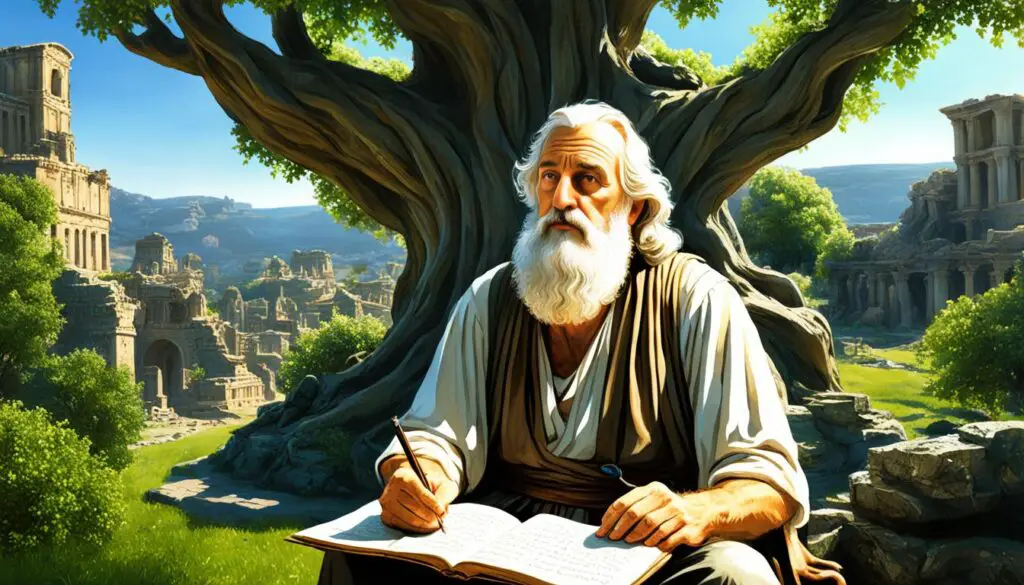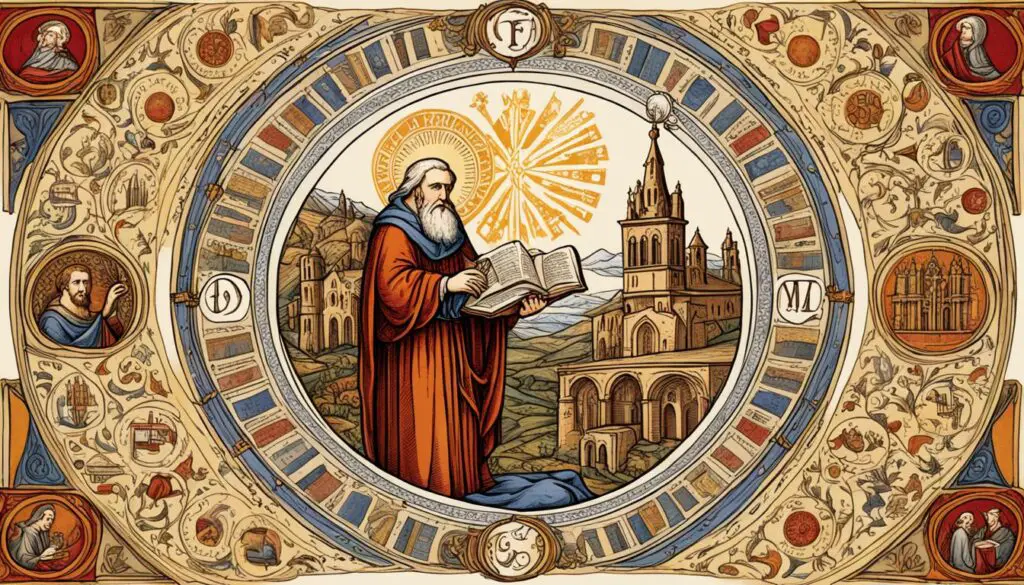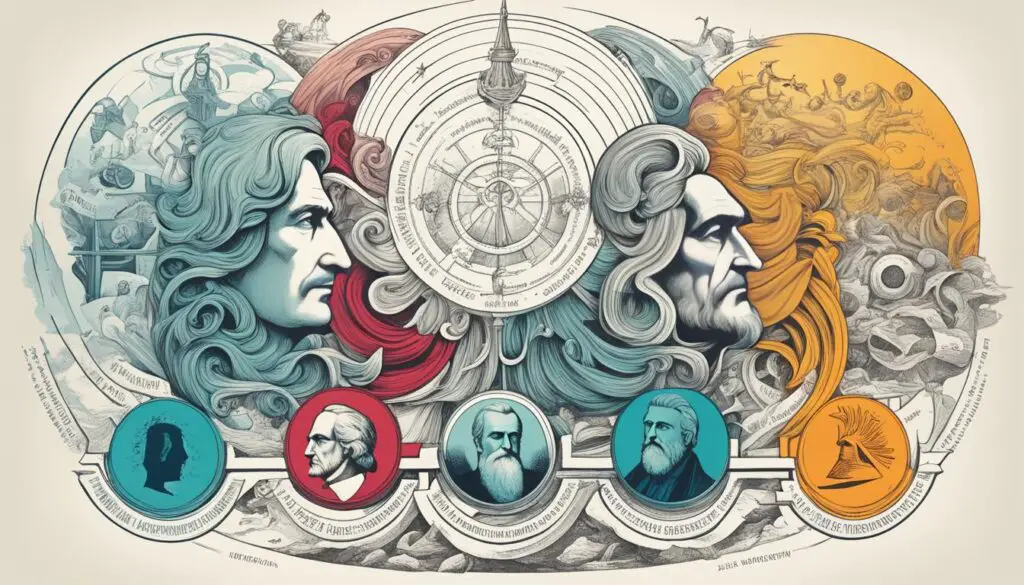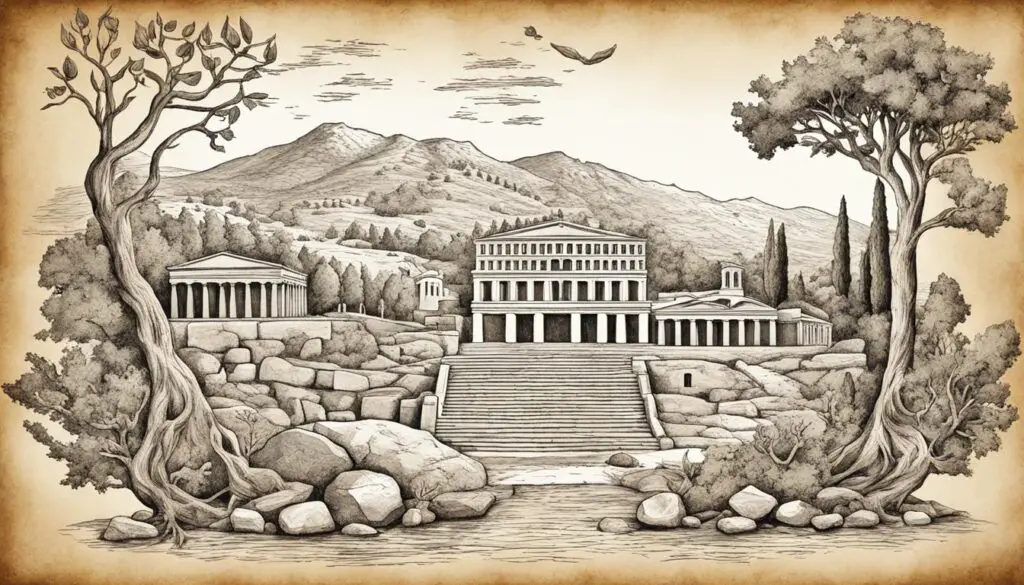A philosophy timeline covers the periods of philosophy ancient, medieval, modern and contemporary. This historical sequence is defined based on criteria such as historical, political and cultural periods. Furthermore, it is important to highlight the evolution and main philosophical currents of each period, as well as the thinkers and their contributions to philosophy.
Main points highlighted
- A philosophy timeline covers the ancient, medieval, modern and contemporary periods
- Each period has its own philosophical currents and important thinkers
- Philosophy has evolved throughout history, reflecting social, political and cultural changes
- Philosophical thinkers influenced the understanding of reality, human nature, and the search for wisdom
- Philosophy remains relevant today, providing reflection on different aspects of the world and ourselves
Ancient Philosophy
A ancient philosophy is a remarkable period in history of philosophy, which ranges from the emergence of the first cities in Ancient Greece to the fall of the Roman Empire. During this period, several philosophical currents emerged, influencing thought and shaping the course of Western philosophy.
One of the most important philosophical currents of this period was pre-Socratism, which was characterized by the search for rational explanations for nature and the world. Great thinkers such as Thales of Miletus, Anaximander and Anaximenes were representatives of this current. They sought to understand reality based on natural principles and primordial elements, without resorting to mythological explanations.
Another relevant philosophical current in antiquity was the sophism, which stood out for valuing human knowledge and teaching rhetorical skills. Sophists believed that absolute knowledge was unattainable, and therefore it was necessary to focus on developing the skills of argumentation and persuasion. Protagoras, Gorgias and Protagoras are some of the important names in this current.
Platonism also had a significant influence on ancient philosophy. Plato, a disciple of Socrates, developed a philosophy based on the existence of a world of ideas, which is perfect and eternal, in contrast to the sensible world, which is imperfect and subject to change. For Plato, the search for knowledge consisted of the contemplation of ideal forms. His works, such as “The Republic” and “The Banquet”, are considered fundamental to understanding the ancient philosophy.

In addition to these philosophical currents, other important schools also emerged in antiquity, such as the stoicism: Epicureanism: skepticism and the cynicism. Each of them had their own conceptions about the nature of reality, morality and the search for wisdom.
| Philosophical Current | Main Philosophers |
|---|---|
| Pre-Socratism | Thales of Miletus, Anaximander, Anaximenes |
| Sophism | Protagoras, Gorgias, Protagoras |
| Platonism | Plato |
| Stoicism | Seneca, Epictetus, Marcus Aurelius |
| Epicureanism | Epicurus, Lucretius |
| Skepticism | Pyrrhus of Elis, Sextus Empiricus |
| Cynicism | Diogenes of Sinope |
Ancient philosophy left an important legacy for humanity, both in the development of philosophical thought and in its influence on other areas of knowledge. The ideas and reflections of ancient philosophers continue to challenge us and provide us with valuable insights into the human condition and the search for wisdom.
Medieval Philosophy
A medieval philosophy comprises the period from the fall of the Roman Empire to the end of the Middle Ages. During this period, philosophy developed mainly in the context of the influence of Christianity and the Catholic Church.
Philosophical currents such as Neoplatonism, Patristics and scholasticism. Neoplatonism was a philosophical current that sought to reconcile Plato's philosophy with Christian theology. Through patristics, philosophers at the time sought to establish a relationship between Greek philosophy and Christianity, developing rational arguments to defend the faith.
A scholasticism was a predominant philosophical current in the Middle Ages, characterized by the application of Aristotelian logic to Christian theology. Scholastic philosophers sought to reconcile faith and reason, using logic to analyze and interpret religious beliefs.
Some of the main philosophers of medieval philosophy include Saint Augustine, Thomas Aquinas and William of Ockham. Saint Augustine, considered one of the fathers of the Church, developed a philosophy that united Christian faith with philosophical speculation.
Thomas Aquinas, in turn, was one of the main representatives of scholasticism, seeking to reconcile Aristotelian philosophy with Christian tradition. William of Ockham was an influential philosopher who questioned many of the ideas established in his time, proposing, for example, Ockham's razor, a logical principle that suggests that, among several possible explanations, the simplest is the most likely.

| Medieval Philosophical Currents | Medieval Philosophers |
|---|---|
| Neoplatonism | Plotinus |
| Patristics | St. Augustine |
| Scholasticism | Thomas Aquinas, William of Ockham |
Modern Philosophy
A modern philosophy is a crucial period in history of philosophy, spanning from the Renaissance to the enlightenment. During this time, great transformations occurred in philosophical thought, with the emergence of currents that profoundly influenced the development of science and society in general.
One of the main philosophical currents of modern philosophy it was the rationalism, which emphasized reason as a source of knowledge and truth. Philosophers like René Descartes, with his famous phrase “I think, therefore I am”, and Baruch Spinoza sought to find a rational foundation for understanding the world and human existence.
On the other hand, the empiricism, a current that valued sensory experience as a basis for knowledge. Philosophers like John Locke and David Hume They believed that all knowledge was acquired through experience and empirical observation of the world.
“All ideas come from experience.” – John Locke
During the period of enlightenment, there was a significant advance in philosophical thought, with the questioning of power structures, religion and traditions. O enlightenment emphasized the importance of reason, progress and individual freedom as pillars for building a more just and rational society.
| Philosopher | Philosophical Current |
|---|---|
| René Descartes | Rationalism |
| John Locke | Empiricism |
| Baruch spinoza | Rationalism |
| David Hume | Empiricism |
A modern philosophy, therefore, represents a moment of great discoveries and intellectual debates that shaped the history of humanity. These philosophical currents influenced not only philosophy itself, but also sciences, politics and culture.

Contemporary Philosophy
A contemporary philosophy covers the period from the 19th century to the present day. During this period, philosophical currents emerged that questioned the foundations of traditional philosophical thought. Some of the most influential currents were the phenomenology: existentialism and the postmodernism.
A phenomenology, developed by Edmund Husserl, was a current that sought to understand the human experience through the analysis of phenomena. This approach emphasized the importance of subjectivity and consciousness in understanding the world.
O existentialism, whose main representatives are Martin Heidegger and Friedrich Nietzsche, placed the individual and his freedom as central themes. This philosophical current explored existential questions and the search for meaning in human life.
O postmodernism, led by Jacques Derrida, questioned the notions of absolute truth and objectivity. This current criticized totalizing systems of thought and emphasized the multiplicity of perspectives and interpretations.

Some of main contemporary philosophers, in addition to those mentioned previously, include Jean-Paul Sartre, Michel Foucault, Gilles Deleuze and Slavoj Žižek. Each of these philosophers contributed their ideas and reflections to the understanding of the contemporary world and the challenges faced by humanity.
| Philosophical Current | Main Philosophers |
|---|---|
| Phenomenology | Edmund Husserl |
| Existentialism | Martin Heidegger, Friedrich Nietzsche |
| postmodernism | Jacques Derrida |
A contemporary philosophy continues to be a vibrant and relevant field of study, exploring philosophical questions pertinent to today's society and challenging established concepts. Through the different philosophical currents and main contemporary philosophers, we are invited to reflect on our existence, the nature of reality and the possibilities for transformation.
Main Philosophical Currents of Antiquity
During ancient philosophy, several philosophical currents emerged that sought to understand different aspects of reality. Currents such as pre-Socratism, Platonism, Aristotelianism, sophism: stoicism: Epicureanism: skepticism: cynicism and the eclecticism. Each philosophical current presented its own conceptions about the world, human nature and the search for wisdom.

| Philosophical Current | Main Philosophers |
|---|---|
| Pre-Socratism | Anaximander, Anaximenes, Pythagoras |
| Platonism | Plato |
| Aristotelianism | Aristotle |
| Sophism | Protagoras, Gorgias |
| Stoicism | Zeno of Citium, Seneca, Epictetus, Marcus Aurelius |
| Epicureanism | Epicurus |
| Skepticism | Pyrrhus of Élida, Sextus Empiricus |
| Cynicism | Diogenes of Sinope |
| Eclecticism | Several philosophers mixed ideas from different philosophical currents. |
These different philosophical currents contributed to the formation of Western philosophical thought, influencing the understanding of human existence, ethics, politics and the nature of knowledge.

Main Philosophers of the Middle Ages
During the Middle Ages, philosophers emerged who significantly influenced the philosophical thought of the time. Philosophers such as Saint Thomas Aquinas, Augustine of Hippo, Albert the Great, Roger bacon e William of Ockham, which addressed issues related to the philosophy of religion, metaphysics, logic and ethics, among other topics.
Those medieval philosophers played a fundamental role in the development of philosophy during the Middle Ages. His works influenced not only philosophical thought, but also theology and science of the time.
| Name | Contributions |
|---|---|
| Saint Thomas Aquinas | He developed the concept of natural theology and sought to reconcile Christian faith with Aristotelian philosophy. |
| Augustine of Hippo | He explored issues such as free will, evil, divine grace and human nature in his philosophical and theological works. |
| Albert the Great | He contributed to the synthesis between Aristotelian philosophy and Christian theology, being considered one of the precursors of Scholasticism. |
| Roger bacon | He stood out for his contributions to science and natural philosophy, defending observation and experimentation as fundamental to knowledge. |
| William of Ockham | He proposed the principle of Ockham's razor and criticized the excessive influence of theology in philosophy, defending simplicity and parsimony in the explanation of phenomena. |
Those medieval philosophers They left a lasting legacy in the field of philosophy, influencing later thinkers and contributing to the development of human thought.

Main Philosophers of Modern Philosophy
In modern philosophy, philosophers emerged who marked the philosophical thought of the time. Some of the leading philosophers of this period include Descartes, Lace, Montesquieu, Rousseau e Hume. Each philosopher presented their own ideas and reflections on knowledge, morality and society.
René Descartes
"I think therefore I am."
René Descartes was a French philosopher who played a key role in the development of rationalism. His best-known work, “Meditations on Prime Philosophy”, reflects his search for certainty and truth through the Cartesian method. Descartes influenced areas such as mathematics and philosophy of mind.
Immanuel Kant
“A human being is what education makes of him.”
Immanuel Lace, German philosopher, is considered one of the main representatives of enlightenment and one of the most influential thinkers in Western philosophy. His work “Critique of Pure Reason” sought to establish the limits and validity of human knowledge, highlighting the importance of reason and ethics in our actions.
Charles-Louis de Secondat, Baron de Montesquieu
“Freedom consists of being able to do anything that does not harm others.”
Montesquieu was a French philosopher and politician known for his work “The Spirit of Laws”. He advocated the separation of powers and influenced the theory of democratic governments. Montesquieu also reflected on the influence of climate and institutions on society.
Jean-Jacques Rousseau
“Man is born free, and everywhere he finds himself in chains.”
Jean-Jacques Rousseau, Swiss philosopher, was an important Enlightenment thinker and one of the creators of contractualism. His work “On the Social Contract” defended the idea of a voluntary contract between individuals for the formation of a fair and egalitarian society.
David Hume
“Reason is, and must be, a slave to the passions.”
David Hume, Scottish philosopher, was one of the main representatives of empiricism. His work “An Investigation into Human Understanding” questioned concepts such as causality and induction, and highlighted the importance of human passions and emotions in decision-making.
| Philosopher | Main Works |
|---|---|
| René Descartes | Meditations on Prime Philosophy |
| Immanuel Lace | Critique of Pure Reason |
| Charles-Louis de Secondat, Baron de Montesquieu | The Spirit of Laws |
| Jean-Jacques Rousseau | Articles of Incorporation |
| David Hume | An Inquiry into Human Understanding |
Main Philosophers of Contemporary Philosophy
Na contemporary philosophy, philosophers emerged who questioned the foundations of traditional philosophical thought. Some of the leading philosophers of this period include Husserl, Heidegger, Nietzsche e Derrida, whose works brought new approaches and reflections on human existence, language, power and the deconstruction of traditional philosophical thought.
Husserl's Works and Contributions
Edmund Husserl, considered the founder of phenomenology, developed a philosophical method that seeks to describe and analyze conscious experiences, highlighting the importance of subjectivity and the relationship between subject and object. His best-known work is “The Idea of Phenomenology”, in which he presents the bases of this philosophical current and its influence on the studies of consciousness and knowledge.
Heidegger's Contribution
Martin Heidegger is known for his reflections on human existence and his relationship with the world. His most famous work, “Being and Time”, seeks to understand the meaning of being through the analysis of temporality and the finite condition of the human being. Heidegger also had an influence on hermeneutics and the philosophy of language, questioning the traditional bases of metaphysics.
Nietzschean Philosophy
Friedrich Nietzsche is recognized for his criticism of traditional morality and values established by Western culture. His work “Thus Spoke Zarathustra” presents a new conception of morality, based on the affirmation of life and overcoming the notions of good and evil. Nietzsche also questioned the idea of absolute truth and proposed the concept of “will to power” as a fundamental force that drives existence.
Derrida and Deconstruction
Jacques Derrida is known as one of the main exponents of post-structuralism and deconstruction. His work “Grammatology” questions the centrality of writing and language in the production of knowledge, highlighting the importance of difference and instability of meanings. Derrida influenced literary studies, political philosophy and cultural theory, questioning the foundations of Western thought and its hierarchies.
These contemporary philosophers brought new perspectives and provocations to the field of philosophy, expanding the horizons of critical thinking and questioning established certainties and conventions. His works continue to be studied and debated, representing important contributions to contemporary philosophy.

Conclusion
A philosophy timeline is a powerful tool for understanding the evolution of philosophical thought throughout history. From ancient to contemporary philosophy, different philosophical currents have emerged, each contributing to the understanding of reality, human nature and the search for wisdom. Through the ancient, medieval, modern and contemporary periods, important philosophers such as Socrates, Saint Augustine, Descartes, Husserl and many others have left a significant legacy for humanity.
Philosophy continues to be an essential field of study for reflection on different aspects of the world and ourselves. It challenges us to question our beliefs, reflect on the meaning of life and seek answers to existential questions. Through the timeline of philosophy, we can understand how ideas and thoughts have been shaped over the centuries and how they continue to influence our thinking and society today.
The philosophy timeline reminds us that the pursuit of wisdom is an ongoing endeavor. It invites us to explore, debate and reflect on life's big questions. Through philosophy, we are challenged to think critically, seek knowledge, and expand our intellectual horizons. The Philosophy Timeline is a constant reminder that exploring philosophical thought is a fascinating and enriching journey for all who are willing to venture into this deep and inspiring field of study.
FAQ
Q: What is the timeline of philosophy?
A: The timeline of philosophy encompasses the periods of philosophy ancient, medieval, modern and contemporary.
Q: How is the historical sequence of the philosophy timeline defined?
A: The historical sequence of the philosophy timeline is defined based on criteria such as historical, political and cultural periods.
Q: What are the main philosophical currents of each period of philosophy?
A: The main philosophical currents of each period of philosophy are Presocratism, Sophism, Platonism, Aristotelianism, Stoicism, Epicureanism, Skepticism, Cynicism and eclecticism.
Q: Who are some of the main philosophers of ancient philosophy?
A: Some of the main philosophers of ancient philosophy are Socrates, Plato and Aristotle.
Q: Who are some of the main philosophers of medieval philosophy?
A: Some of the main philosophers of medieval philosophy are Saint Augustine, Thomas Aquinas and William of Ockham.
Q: Who are some of the main philosophers of modern philosophy?
A: Some of the main philosophers of modern philosophy are Descartes, Kant, Rousseau and Hume.
Q: Who are some of the main philosophers in contemporary philosophy?
A: Some of the main philosophers of contemporary philosophy are Husserl, Heidegger, Nietzsche and Derrida.





